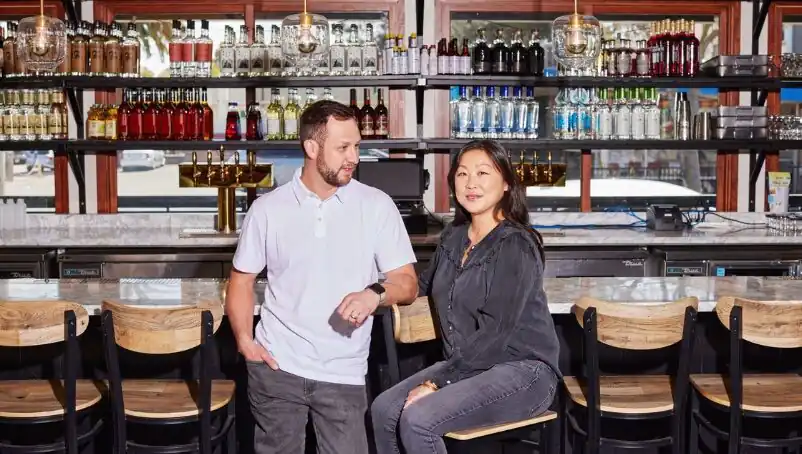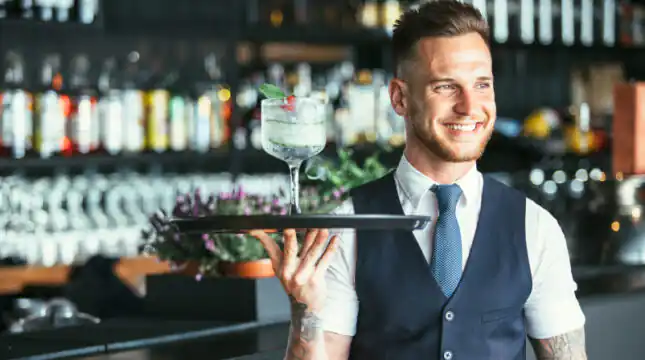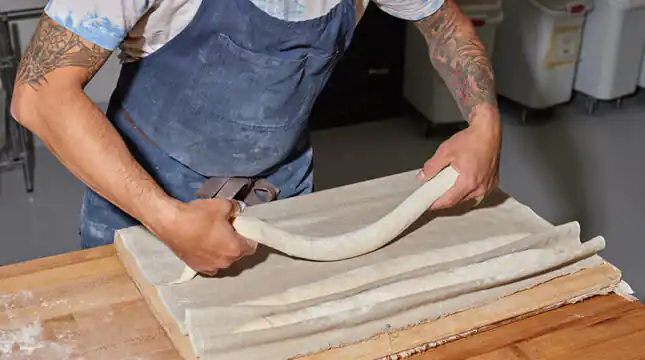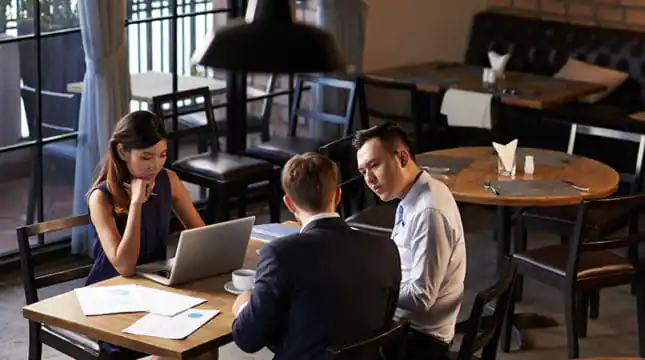Do you need an Indiana liquor license?
Food service business owners looking to serve alcohol in Indiana must have a license issued by the Indiana Alcohol and Tobacco Commission (ATC).
However, it’s tricky because the Indiana ATC lists 93 types of liquor licenses depending on your business type and what kind of beverages you plan on selling. This can make acquiring a license a sometimes long — and expensive — process.
Transferring liquor licenses in Indiana is a frequent and vital aspect of the food service industry.
Indiana caps the number of licenses available, and the ATC claims that 99% of areas within city limits are already tapped out. A transfer of ownership is how most food service businesses obtain permission to operate.
How to get a liquor license in Indiana
When applying for a liquor license in Indiana, it’s crucial to first determine the types of drinks you wish to serve. Indiana offers different licenses depending on if you want to serve just beer, just wine, wine and beer, or have a full bar with wine, beer and liquor.
However, the more you explore Indiana liquor licenses, you’ll find that the process is even further segmented. For instance, incorporated businesses must apply for a different permit than unincorporated ones. Additionally, if your food service business plan involves carry-out alcohol sales, there’s a specific permit for that, too.
Identifying the exact license you need becomes easier once you’re clear about what and how you want to sell in your establishment. The ATC has made it as straightforward as possible by listing every license type they offer with simple descriptions on their website.
The entire process for obtaining a liquor license can take as long as 10 to 12 weeks, according to the Indiana ATC. That timeline applies to new license applications and transfers. Renewing a permit is slightly faster, taking around eight to 10 weeks.
Due to this lengthy timeframe — which you can’t expedite –– the ATC recommends not setting an opening date for your business until you have your license in hand.
1. Choose the right license and where to operate
To get your liquor license in Indiana, the first step is to decide which of the 93 types of licenses you want for your business. Once you know what kind of license you want, you need to decide where you want to open your business and if the area has any licenses available.
Remember, Indiana limits available licenses based on population, so bigger cities will have more licenses available than small towns but more competition to obtain them.
2. Contact the ATC
You can call the ATC and speak to a processor for guidance. They’ll be able to tell you if the type of license you need is available at the location where you would like to operate.
It’s likely the quota is full. In that case, you’ll need to find a current license holder who is willing to sell their license.
3. File your liquor licensing paperwork
Once you know that the license type you need is available, it’s time to fill out forms and file the required paperwork to the ATC. If you’re buying an existing license, you’ll complete a “transfer of ownership” application. You may also need other applications and documents, depending on your situation.
4. Wait for license approval
After the ATC reviews your initial paperwork, they’ll send it to the local alcoholic beverage board for a hearing. You’ll be given a chance to make your case for why you should be given a license to sell alcohol at your business.
Post-hearing, the board makes a recommendation to the ATC. The ATC reviews the recommendations at a monthly meeting and makes a final decision to approve or deny your request.
If you’re into flowcharts, ATC has laid out the whole process (including what happens if you appeal their decision) here.
It may seem like a lot, but it’s Indiana’s way of ensuring that every business selling alcohol has been thoroughly vetted and will benefit the community they serve.
How much is a liquor license in Indiana?
Due to the limited nature of Indiana liquor licenses, the competition (and price) of obtaining one can be extremely high. Because Indiana limits the available license quote allowed, it’s likely you’ll need to consider purchasing one from a current license holder.
The process can be simple and cheap or very difficult and expensive. Indiana law requires the ATC to collect and post sale prices for transferred permits. Transfer prices range from $1 to over $1 million, depending on the type of permit and location.
If you have a friend retiring from the restaurant industry in the same area you want to open your restaurant, you might not pay much at all.
However, if you’re trying to open a spot in a competitive area, you might pay six figures or more to someone who is looking to sell their license.
Luckily, you don’t need to knock on every restaurant’s door in your area to try to buy a permit. A call to the ATC can connect you with individuals and firms that can help you find someone willing to sell their license.
If you’re fortunate enough to get a new liquor license in Indiana from the ATC, fees range from $500 for a small brewer or beer retailer up to $40,000 to offer beer, wine and liquor in Hamilton and Boone. Licenses last one year, and if renewed on time (more than 90 days before their expiration date), the renewal costs are generally the same.
Insurance for an Indiana liquor license
Here are some of the food and beverage service insurance options that Indiana business owners should consider:
Liquor liability insurance
Liquor liability insurance can protect your business from some of the risks associated with serving alcohol, including an intoxicated customer causing injury to others or property damage.
For instance, if a drunk patron knocks another customer down, causing an injury, liquor liability insurance can help pay for related medical, legal and property damage expenses.
General liability insurance
General liability insurance safeguards against common public interaction risks, such as injuries to non-employees (like slip-and-fall accidents) and accidental damage to property you don’t own.
Workers’ compensation insurance
Indiana law states that most businesses with employees must have workers’ comp insurance. It steps in to cover costs if an employee is hurt or becomes ill while on the job.
Commercial property insurance
Commercial property insurance helps protect the things you need to do business, including your food inventory, kitchen equipment, front of house furnishings and the structure where your business is located.
Indiana liquor license requirements
The ATC offers a simple checklist of everything you need to have to obtain a liquor license in Indiana. The documents vary depending on if you’re a retailer, dealer, or wholesale distributor or manufacturer. Generally, you’ll need:
- New or transfer permit application
- Property tax clearance schedule
- County Verification of Business Location
- Certificate of Existence from the Indiana Secretary of State
- A floor plan that meets ATC requirements
- Payment in the form of a business check, cashier’s check, or credit card
If you are getting your license through a transfer (which you most likely are), in addition to the above, you’ll need to supply the following documents:
- Consent to Transfer
- Affidavit of Purchase Price
You’ll find a more comprehensive listing, including forms, formatting, and where to submit the documents, online at the Indiana ATC website.
Indiana liquor license renewal
Renewing your liquor license is much simpler than getting a new one. If you renew more than 90 days from when your current license expires, all it takes is:
- Renewal of alcoholic beverage permit application
- Property tax clearance schedule
- Payment in the form of business check, cashier’s check or credit card
If you’re within 90 days of your permit expiring, you’ll have to file a Request for Extension of Alcoholic Beverage Permit and pay an additional extension fee of $200.
Liquor liability and dram shop laws in Indiana
The ATC requires any employee who serves alcohol to obtain a permit. That could include your restaurant’s bartender, a server or even a manager. If someone brings drinks to patrons, they need an employee permit.
Once employees receive their permit, they must complete a mandatory server training course within 120 days. ATC offers free online server training courses that can be completed simultaneously with the permit application.
Indiana is a dram shop liability state. That means that state law allows a person injured in an alcohol-related accident to:
- File a civil suit for damages against the person who caused the accident and;
- File against the business that sold or served alcohol to the intoxicated person.
For example, suppose a group comes to your restaurant to celebrate a friend’s birthday. They order multiple rounds of drinks and have a good time. Unfortunately, they get into a car accident on the way home that injures the other driver.
If the driver who was at your business is over the legal limit, the other driver can sue them for damages. However, your business could be liable if your establishment served alcohol to the driver after the bartender had actual knowledge that they were visibly intoxicated.
How NEXT helps support Indiana businesses that serve alcohol
NEXT offers customized business insurance for Indiana small business owners. We offer liquor liability insurance with our general liability coverage.
With our online services you can get a quote, review coverage options, purchase insurance and have your certificate of insurance in about 10 minutes.
Start a free quote with NEXT.






